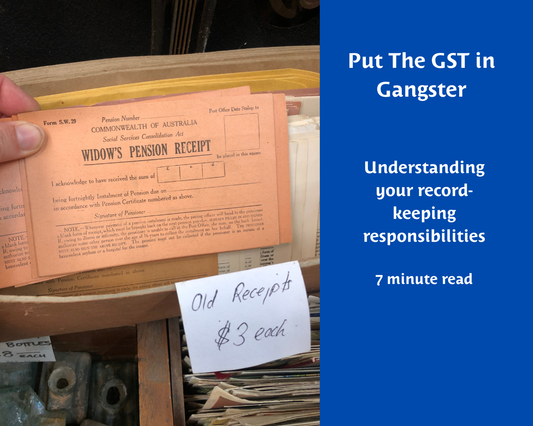Let's Talk About Record-Keeping (Yes, It's Boring But Important)
Look, running your own business is all about doing the thing you love - making your art, serving your clients, building your brand. But there's also the less glamorous side: keeping your records straight so the ATO stays happy and you stay compliant.
Is it called ADMIN because it ADds stress and MINimises happiness?
We want to be upfront about what's actually required by law, and how we can work together to make this as painless as possible.
The Legal Stuff (Sorry, But It's Real)
Under Australian tax law, you need to keep all records that explain your income and expenses. And I mean ALL. That $5,000 sale? Yep. That $2 coffee receipt you claimed? Also yes.
The ATO doesn't just skim the surface. They look for inconsistencies in everything - invoice numbering, cheque sequences, your cost-of-goods margins, travel expenses, motor vehicle claims. They're thorough like that.
How long you need to keep things:
- Most business records: 5 years from when you lodge your tax return
- Payroll records: 7 years after the end of the financial year
I know. It's a lot of paper (or more likely (I HOPE), digital files).
What Actually Needs to Be Kept?
Here's the breakdown of what your business needs to hold onto:
Sales Records
- Sales invoices and tax invoices
- Sales vouchers or receipts
- Cash register daily reports
- Bank and credit card statements
- Point of sale system records
Purchase Records
- Valid tax invoices
- Purchase receipts or proof of payment
- Cheque butts, bank and credit card statements
- Electronic transfer information
- Private usage calculations (for things you use for both business and personal reasons)
Employee Records
- If you have staff, this gets even more involved. You need to keep:
- Full employee details (name, date of birth, address, TFN, when they started)
- Modern award or instrument details
- Employment contracts and classifications
- Whether they're casual, part-time, or full-time
- Timesheets, rosters, hours worked
- Pay rates, allowances, loadings, deductions
- Leave records (both taken and accrued)
- Super details
- Termination documentation if someone leaves
Year-End Records
- Asset and vehicle purchase documents
- Debtors and creditors lists
- Inventory and stocktake details
- Depreciation schedules
- Share transactions
The GST Thing You Might Not Know
Here's something that surprises a lot of people: You can claim GST credits for purchases up to $82.50 without a full tax invoice, as long as you have records supporting the claim (like cash register dockets or basic receipts).
BUT - and this is important - you still need proof of payment. No receipt at all means no GST claim, even for small amounts.
How We Work Together: The Different Levels
The scope of what we do for you can vary, and it matters for both compliance and what you'll pay us. Let's be clear about who's doing what.
Level 1: We Handle Everything
We process all your transactions, code them properly according to bookkeeping and GST rules, and take full compliance responsibility. This means we're:
Checking that all documentation exists before claiming GST
Making sure your sales invoices meet tax invoice requirements
- Querying anything unclear or dodgy-looking
- Giving you lists of errors that need your attention
This is the most hands-on (and time-intensive) approach.
Level 2: You Lead, We Follow
We process transactions based on what's happened before or information you give us, but you're responsible for making sure you've got valid tax invoices and proof of payments. We'll still ask questions if something unusual or significant pops up.
This is the most common level of engagement.
Level 3: We Review and Reconcile
We do your bank reconciliations, credit card reconciliations, and run bookkeeping logic checks to make sure everything makes sense. You keep all the records and source documents yourself.
I don’t love this approach because I’ve often found that while it may seem like the easy solution in the moment, inevitably at some stage someone will ask for documentation or more information and by then everyone has forgotten, misplaced the document or moved on with their lives. Then it is MY FAULT even if it was the agreement with the client from the get-go.
Level 4: BAS Prep
If we're preparing your Business Activity Statement (which requires us to be registered BAS Agents), we need to be clear about how much checking you want:
- No source document checking
- We only review documents when we question something
- Quality review checking
- 100% document checking (yes, every single thing)
- An agreed percentage of spot-checking
Again, this is not the ideal scenario in my opinion, but we do offer this as a service in the hope that one day you’d like to pay us to do the bookkeeping instead of doing it yourself. If you do choose to not upload receipts for us to validate your GST claims, then it's ALL CARE but not really any responsibility on our part. If you want to do your own bookkeeping and then end up making a mess of it, it will often cost you more, and cause many tears, to fix it up.
Starting Out vs. Ongoing Work
When we first start working with you, or when we take on a new client, we do a pretty comprehensive review. We need to understand your business and get your system sorted.
Once things are humming along and your record-keeping is solid, we might not need to check everything so intensely - but only if we've agreed that's how we're working and your processes are tight.
If we're staying fully responsible (Level 1), our thoroughness doesn't change. If we're in a review role (Level 4), our ongoing work becomes more about catching exceptions and doing periodic quality checks rather than examining every transaction.
Why Any of This Matters
As registered professionals, we have to take "reasonable care" to make sure you're compliant with tax law. We can't be part of anything false or misleading, even accidentally.
So this isn't us being pedantic or trying to make your life harder than it already is - it's legally essential for both of us. We need to be on the same page.
The ideal situation isn't us validating every single expense and GST claim every single time (that would be expensive and time-consuming for you). Instead, it's setting up solid record-keeping processes that you can maintain, so we can focus on the exceptions and give you strategic advice where it matters.
Let's Find What Works for You
Folks, I get it. Business compliance is comprehensive and can feel overwhelming. But proper bookkeeping isn't just an expense - it's an investment in protecting yourself and understanding your business health.
We can work with you at whatever level suits your needs and budget. Full-service processing, targeted reviews, somewhere in between - let's have a conversation about what makes sense for your situation.
Got questions about what you're supposed to be keeping or how we should work together? Email us at help@countingclouds.com.au - we're here to make this stuff less painful.




